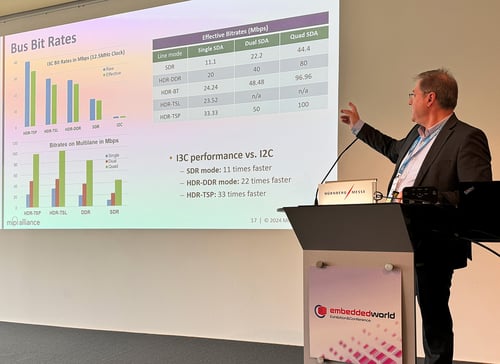2 min read
Major UniPro Update Targets Evolving Needs of Flash Memory Storage Applications
![]() Sharmion Kerley, MIPI Director of Marketing and Membership
:
28 July 2022
Sharmion Kerley, MIPI Director of Marketing and Membership
:
28 July 2022

- News & Events
- News
- Blog
Since its introduction in 2007, MIPI UniPro® has been incorporated into multiple versions of the JEDEC Solid State Technology Association's Universal Flash Storage (UFS) standard as its transport and link layers, along with MIPI M-PHY® serving as its physical layer. A major update to the versatile, application-agnostic MIPI UniPro transport layer for chip-to-chip/interprocessor communication (IPC) applications was recently released to MIPI Alliance members and includes new features developed in collaboration with JEDEC for its upcoming UFS 4.0.
UniPro v2.0 Delivers Key Enhancements
JEDEC UFS is globally established as a high-performance interface for connecting memory components. Such components can be deployed in a variety of products, including smartphones, drones, action cameras, consumer devices, tablets and mobile computing products, as well as infotainment platforms and telematics hubs in automotive systems. Ever-greater speed and ever-lower power consumption are continual needs among system designers relying on JEDEC UFS.
UniPro v2.0 delivers new features that double the specification’s data rate, boost throughput and slash latency. JEDEC's forthcoming UFS 4.0 standard will take advantage of these enhancements, as well as those in M-PHY v5.0, which was released in late 2021. To ensure that the latest versions of these specifications would address industry requirements, the MIPI UniPro and M-PHY working groups collaborated with JEDEC UFS designers while crafting the updates.
A 27 July MIPI Alliance press release highlights the enhancements delivered in UniPro v2.0:
- Deployed on MIPI M-PHY at the physical layer to optimize throughput, system performance and service quality, UniPro v2.0 uses M-PHY v5.0's new “High Speed Gear 5” (HS-G5) to increase bandwidth to 23.32 Gigabits per second (Gbps) per lane and per direction. That’s twice the speed of the previous UniPro v1.8 specification.
- UniPro v2.0 improves the specification’s L2 layer packet payload length from 272 to 1144. This at the same time decreases protocol overhead and increases link speed, resulting in improved throughput of storage applications.
- UniPro v2.0 reduces latency for high-speed linkup (or “stack boot”) in storage applications by up to about 8 milliseconds.
The updated specification also removes features such as lower speeds that largely have fallen out of use within the flash storage industry. This is intended to simplify integration and optimize various production and implementation efficiencies for UniPro v2.0 users.
"The revisions in MIPI UniPro v2.0 were driven by the real-world needs—higher bandwidth and data rates, greater efficiency, reduced latency, and minimized verification, validation and testing cycles—requested by designers from across the flash storage ecosystem,” said Sanjiv Desai, chair of MIPI Alliance, in the press release. “Over the years, UniPro has proven to be both mature yet flexible enough to evolve for diverse and new architectures. We will continue to innovate the specification through ongoing collaboration with the JEDEC UFS community.”






